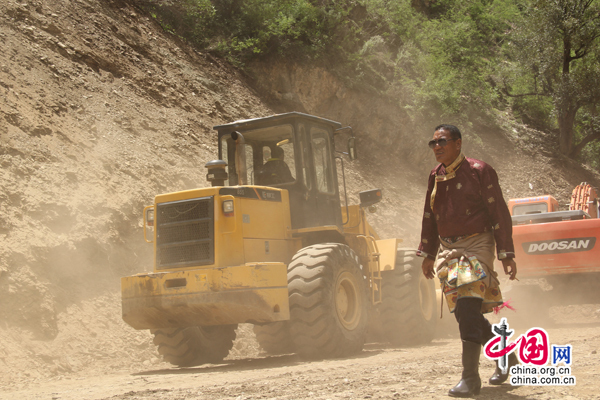Tibetan man paves a road out of poverty
chinagate.cn by Liu Hui, May 25, 2016 Adjust font size:
 |
|
Wang Haibin, a Tibetan man living in Bala Village in the Diqing Tibetan Autonomous Prefecture of southwest China's Yunnan Province, leads locals to repair a road damaged by a medium-intensity earthquake of 5.1 magnitude that hit in mid-2013. [Photo by china.org.cn] |
The Bala Village has never had a chance to unveil the mysteries of its surreal natural beauty or the impact of its extreme poverty until Wang Haibin's successfully built a 35,000-meter road.
Sitting high in the clouds at the heart of the Balagezong Shangri-la Grand Canyon National Park in Yunnan, the village was previously isolated from the outside world.
"The locals live without electricity, let alone other modern facilities. To make matter worse, it is impossible for most of us to get through to outsiders due to poor road connectivity," said Wang, adding that kids there couldn't even afford shoes due to the area's poverty.
It was only through a lucky opportunity that Wang was able to interact with the outside world and leave his hometown to engage in entrepreneurial projects. Almost 20 years later, Wang went back to his hometown with a great fortune.
"It is indeed shameful for a rich man to witness all his neighbors suffering from extreme poverty," said Wang while explaining his determination to make changes.
In 1998, Wang, together with local villagers, made a big push to open their rural valley. In 2008, a new highway was built while a path going zigzag up to mountains. Much of the 35km was an engineering marvel.
"This is our unique 'Road to Heaven,' just like the Qinghai–Tibet railway that connects the autonomous region to the rest of China," locals said.
Not surprisingly, the road has given villagers the change to lead a decent life. According to a local official, their annual income has raised from 2,000 yuan (U.S. $305) to approximately 100,000 yuan (U.S. $15,280).
After the completion of the road, Wang continued his anti-poverty efforts, such as enhancing his strategies to promote ecological agriculture and developing farm-based tourism area designed in a Tibetan style.
In 2011, Wang sought his community's input for a long-term development plan while diverting much of his attention to natural preservation. Wang felt that they shouldn't ruin the striking and beautiful natural scenery of their village just for the sake of economic growth.
"I used to see our villagers as the most unlucky people in the world because of their extreme poverty and primitive simplicity. It remains to be a land full of peace and tranquility but things appear more promising," said Wang.